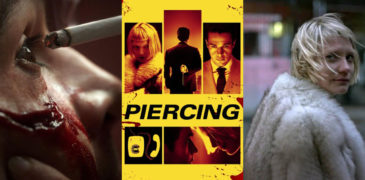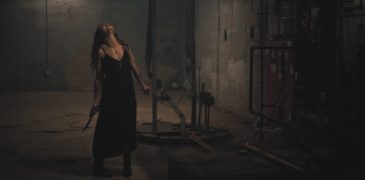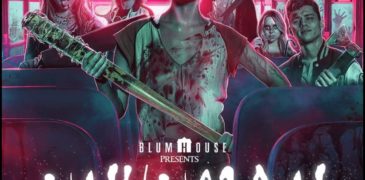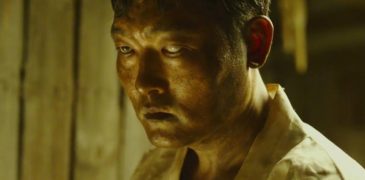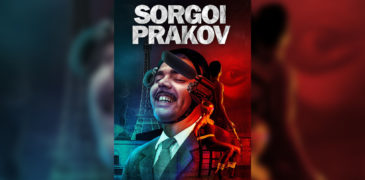
If it doesn’t fizz or pop or ooze, Lucio Fulci isn’t interested in the details. If it can’t be removed by force or eaten while still alive, he’s just going to shrug and ask what difference should the rest of the movie make to him. At times the reek of his indifference is unavoidable. His characters will float in and out of frame, appearing as apparitions that we have hardly been given any reason to believe in. As for his stories, they will be less written and more the result of a slight disorder of the stomach, containing not so much a plot as they do a fragment of an underdone potato. Fulci, like the miserly Ebenezer Scrooge, resolutely denying the presence of Jacob Marley’s ghost, simply will not pay his movies any more mind than he would a slight derangement of the senses. He’ll dismiss them as nothing but a delusion being played on his audience, a trick upon the nervous system brought about by either an undigested bit of beef or a piece of cheese. Something one simply must wait to run its course.
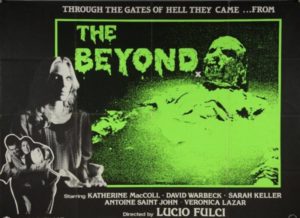
Until the main attraction arrives, loudly shaking its chains and demanding to be whipped bloody, Fulci makes it quite clear that he is not about to be disturbed into sweating over such frivolities as logic or coherence. These would only get in the way of all the vile things he came here to do and so please take your complaints that nothing makes any sense elsewhere. Fulci is not in the business of holding your hand through his plotting. In fact, he’s probably the last person to be asking for any sorts of directions around these parts. He does not know where he is going any more than you do, and so to ever trust the way he is pointing is to soon vanish forever from the face of the earth.
But if you are really determined in seeing what Fulci is in the business of doing, go ahead if you must and offer him your hand. Dismemberment bait such as this, after all, is the only way to ensure you’ll get his attention. In fact, it seems that the only time we will ever definitively know what is happening in one of his films is in those moments when something suddenly appears that is just the perfect size to shove into some poor soul’s eye socket. Then, without fail, whether this object happens to be something long and sharp like a screwdriver, or blunt and forceful like a thumb, we can finally be certain as to what is about to happen next. It is a rare moment. And as long as the actor in question does not blink or suddenly look away as the pressure is applied, Fulci can at long last utter his declarative artistic mantra of “Gouge it out”.

Now, of course, Fulci isn’t nearly as narrow-minded of a director to not give consideration to any other tasty appendage that may appear on screen. Really anything at all that can be thrashed until it is a squirting pulp will do. But it will only be when such opportunities as this appear that Fulci will finally manage to wrestle himself up from his lethargy and start making clear headed decisions as the director of the film. Decisions such as suddenly moving the cameras as close as possible to the carnage so that every bit of gloop that is about to be excreted, and every strip of latex skin that’s about to be picked clean from a bone, is all captured in loving detail. In these moments he will focus the film so narrowly that the rest of the movie ceases to exist. And if you miss anything the first time, worry not. He will likely show it again from a different angle; play it over and over again like the unfurling brains of JFK in the Zapruder film. When he’s finally finished the actor will have pretty much dissolved under the director’s enthusiasm. As much as Hitchcock liked to claim he treated his actors as cattle, Fulci is the master of the abattoir that they are sent to. While they are in his care, all they can do is mill about aimlessly in their stalls while they wait for the fates he is itching to dole out.
Ultimately though this will be the curse of every great work by Fulci. He seems not only to be unaware that he is supposed to be making an entire film, he seems even less aware this film that he has thus far been neglecting has actually been pretty damn good so far. Well, at least up until the point he stops everything to give us the money shot that we really don’t need.
This is the great unfortunate truth of Fulci’s filmmaking. That for all of his fame as a master of cheap and unnecessary splatter, it’s this very signature of his that often threatens to undo the strange, hypnotic indifference that often haunts the surrounding scenes in his films. When he suddenly chooses to ground his movies in these methodological scenes of gore, it works in stark contrast to what has been so compulsively interesting about them up until that point. As soon as he starts making a show of detailing the long process of separating an arm from its body, or how flesh can be as malleable as warm cheese when under the pinch of some teeth, his movies no longer feel so beautiful beyond any kind of control or internal logic. They now seem to have a purpose, and it’s a cheap and ugly one.
As it turns out a Fulci film is most unsettling in those moments where we realize he has given us absolutely no sign posts to guide us through these worlds he’s created. It is a completely alien terrain to the average moviegoer. He grants us no characters we can ever truly trust since he never really bothers to properly introduce us to any of them. Also, his villains aren’t given anything but the vaguest of end games, so we can never be sure exactly what it is they want, or just what awful thing they might do to get it. Even the very destination his movies are seemingly leading us towards will eventually become abstracted as we realize we will never make it all the way there. Instead, we are forever destined to be left swirling in the indecisive toilet flush of his plotting. His movies are like some awful place we visit in a nightmare that we keep trying to run away from, only to keep returning to their beginning. They can’t be escaped from or reasoned with. They are a purgatory with only the sound of terribly dubbed voices calling out to guide us. In such a strange and disorienting place as this, all a prolonged scene of a characters dismemberment can possibly do is commit the sin of giving us enough time to regain our bearings, recapture our balance, and suddenly make us aware that all we are actually watching might only be some cruddy slice of unenthusiastic exploitation.
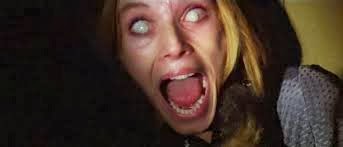
There are occasions though where the deliberateness of Fulci’s more stupidly violent impulses can actually sharpen the sense of horror that is always lying in wait just beneath his muddied storytelling. It’s in The Beyond that two such scenes can be found, and while in typical Fulci fashion, they can’t help but grind the whole film to a momentary standstill, they also seem to strangely compliment the elusive, impossible to pin down strangeness of the surrounding film. In both of these instances, whether the victims are meeting their agonizing demise at the hands of spiders who pull apart their face one nostril at a time, or the moment where, after an unfortunate spillage of hydrochloric acid, a young girl is chased from a room by a frothing pool of her mothers melted head, something just seems off, and no matter how close the cameras are shoved into the details of these deaths, the less real they end up seeming. This is because our director never gives these victims of his the go-ahead to struggle against their fates. In both cases these characters just lie there in passive acceptance of their coming disintegration. They do not scream, or even make any move to get away. All they can do is lay there like props as Fulci gets what he wants from them.
So it is even in these moments, where everything slows down and the cameras zoom ever closer, that the audience is still left puzzled at how they are supposed to react to the images on the screen. In any traditional film such scenes of violence would either elicit sympathy, or cause us to wince, or at the very least titillate. But this is not so in Fulci’s world. Even as we voyeuristically peer closer and closer in on the death of a character, the audience is never entirely convinced to take any active participation in what they are watching. There is absolutely no appeal for us to begin rooting for the survival of these characters, nor are we permitted to feel any empathy for their pain. The closer we watch over their final moments, the less like people they even seem. Not only does Fulci end up letting the camera’s gaze linger long enough to start noticing the artifice of his plastic spiders, and the not-quite-human pigment of the skin that is slowly being dissolved by acid, he’s also letting us see in great detail how even the victims in his films are more figments than actual people. By denying them the most base of reactions—an urge for survival, a response to pain, a cry for help—he strips us of our ability to at least see something of ourselves in his films. In this way his approach remains consistent, whether it be during his strange, elliptical plotting and impenetrable character motivations, or if it’s just a simple matter of gratuitous blood letting. These are not worlds we can understand through any sort of standard logic. We are treated merely as tourists in these films, and while Fucli might on occasion slow the tour bus down to let us get an eyeful of some roadside carnage, before long we are pushing forward as if nothing of any great significance even happened. When a character dies in one of his films, there is never even a void felt in their ensuing absence. It’s like they were entirely erased from the films memory.
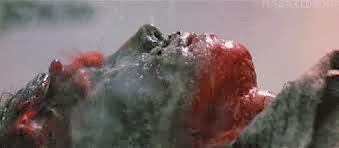
The effect of this, whether intentional or not, creates a movie experience that’s as hopelessly impossible to remember in detail as a dream. It merely lingers in the back of our minds like a repressed memory. By the time it finishes, while we have the sense that we may have seen some unpleasant things along the way, and that there was something vaguely menacing happening we were meant to feel threatened by, the more we try and put our fingers on what we just experienced, the easier it becomes to dismiss the whole film as something that had been imagined in the throes of some fever. That it never really even happened. For surrealists such as Bunuel or Jodorowsky, such an effect would be the desired result after years of hard work honing their craft. But for Fulci, this ability comes so effortlessly you get the sense that he could do it in his sleep. It’s a technique one can easily imagine that he took advantage of indulging as often as possible while on the set of The Beyond, and if it weren’t for the constant nuisance of having to wake up and call out ‘Action’, it’s possible Fulci’s entire filmography would have never left his mind as he slept through his entire career. I can practically see him with his dozing eye pressed up against his camera, shut firmly to prevent gouging, twitching ever so slightly at all of the terrible things in his head.
More Reviews
Book-to-film adaptations often get a bad rap. It’s rare for them to truly satisfy the audience, and they hardly ever live up to the expectations of the fans of the… Inspired by Nanami Kamon’s original novel, Room 203 is Ben Jagger’s new film that explores one of the most memorable horror genre staples: the haunted property. This trope is always… A school trip to get back to nature for extra credit goes very wrong, very fast. A group of students gets in an accident after their bus hits someone, or… In the summer of 2009, a Korean blogger claimed to have seen a strange creature near Jangsan, a mountain in Busan. The following year, the creature was spotted again. As… Selected to cap off the closing night of Fright Fest 2021, The Advent Calendar has come to the attention of horror fans as one of the titles already announced as… Sorgoi Prakov (also known as Descent into Darkness, My European Nightmare) is a 2013 French found-footage horror film written and directed by Rafaël Cherkaski, with additional writing from Quentin Boeton and…Piercing (2018) film review- A gory adaptation done right
Room 203 (2022) Film Review: Friendship Brings Fresh Air to a Haunted Room
Unhuman (2022) Film Review – The Breakfast Club vs Zombies
The Mimic (2017) Film Review – South Korean Urban Legend
The Advent Calendar Film Review – Eat Chocolate or Die!
Sorgoi Prakov (2013) Film Review – Dare I Live the European Dream?
